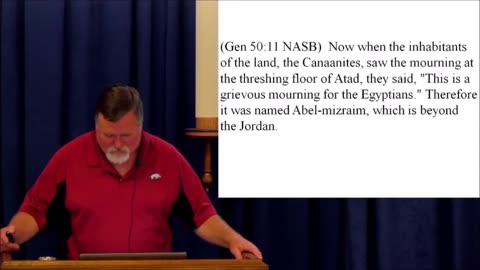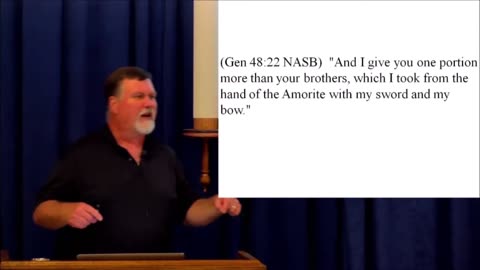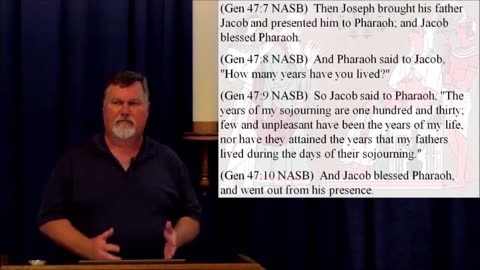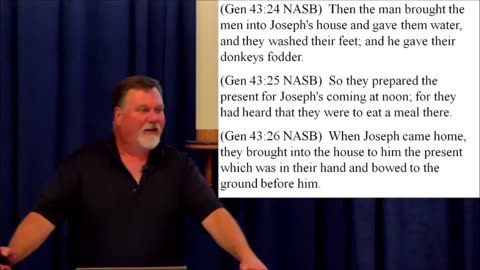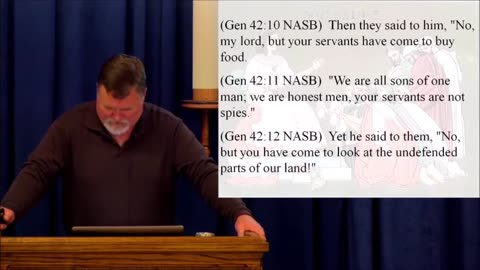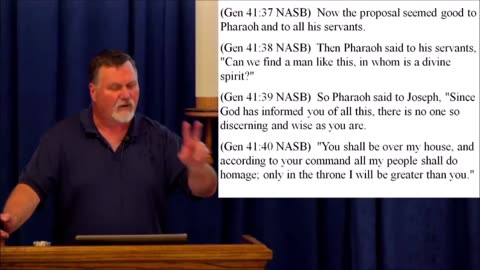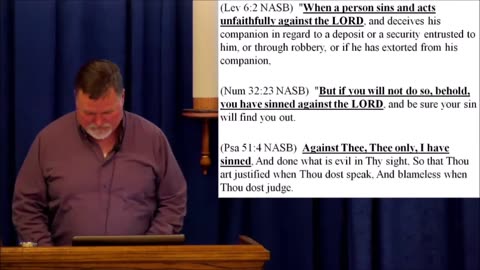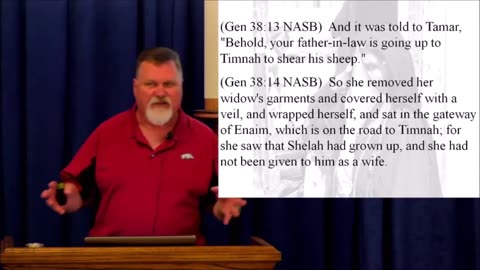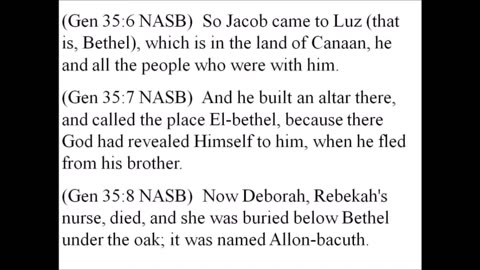-
Gen 50 – Why did Joseph say “Do not be afraid, for I am in God’s place?”
 RVTAGen 50:19 But Joseph said to them, "Do not be afraid, for am I in God's place? Why does Joseph say this? He obviously knows the Torah of Elohim. Lev 19:18 ‘You shall not take vengeance, nor bear any grudge against the sons of your people, but you shall love your neighbor as yourself; I am the LORD. Vengeance is not something that belongs to us. It belongs to Elohim. Deut 32:35 ‘Vengeance is Mine, and retribution, In due time their foot will slip; For the day of their calamity is near, And the impending things are hastening upon them.’ This is yet another long list of evidences that the Instruction of Elohim was in place long before Sinai.5 views
RVTAGen 50:19 But Joseph said to them, "Do not be afraid, for am I in God's place? Why does Joseph say this? He obviously knows the Torah of Elohim. Lev 19:18 ‘You shall not take vengeance, nor bear any grudge against the sons of your people, but you shall love your neighbor as yourself; I am the LORD. Vengeance is not something that belongs to us. It belongs to Elohim. Deut 32:35 ‘Vengeance is Mine, and retribution, In due time their foot will slip; For the day of their calamity is near, And the impending things are hastening upon them.’ This is yet another long list of evidences that the Instruction of Elohim was in place long before Sinai.5 views -
Gen 48 &49 - What does it mean that Judah's Descendant will wash His clothes in the blood of grapes?
 RVTAGen 49:11 "He ties his foal to the vine, And his donkey's colt to the choice vine; He washes his garments in wine, And his robes in the blood of grapes. What does it mean that Judah's Descendant will wash His clothes in the blood of grapes? He is coming in judgment. Isa 63:1-3 Who is this who comes from Edom, With garments of glowing colors from Bozrah, This One who is majestic in His apparel, Marching in the greatness of His strength? “It is I who speak in righteousness, mighty to save.” 2Why is Your apparel red, And Your garments like the one who treads in the wine press? 3“I have trodden the wine trough alone, And from the peoples there was no man with Me. I also trod them in My anger, And trampled them in My wrath; And their lifeblood is sprinkled on My garments, And I stained all My raiment. Rev 14:18-20 And another angel, the one who has power over fire, came out from the altar; and he called with a loud voice to him who had the sharp sickle, saying, “Put in your sharp sickle, and gather the clusters from the vine of the earth, because her grapes are ripe.” 19And the angel swung his sickle to the earth, and gathered the clusters from the vine of the earth, and threw them into the great wine press of the wrath of God. 20And the wine press was trodden outside the city, and blood came out from the wine press, up to the horses’ bridles, for a distance of two hundred miles.12 views
RVTAGen 49:11 "He ties his foal to the vine, And his donkey's colt to the choice vine; He washes his garments in wine, And his robes in the blood of grapes. What does it mean that Judah's Descendant will wash His clothes in the blood of grapes? He is coming in judgment. Isa 63:1-3 Who is this who comes from Edom, With garments of glowing colors from Bozrah, This One who is majestic in His apparel, Marching in the greatness of His strength? “It is I who speak in righteousness, mighty to save.” 2Why is Your apparel red, And Your garments like the one who treads in the wine press? 3“I have trodden the wine trough alone, And from the peoples there was no man with Me. I also trod them in My anger, And trampled them in My wrath; And their lifeblood is sprinkled on My garments, And I stained all My raiment. Rev 14:18-20 And another angel, the one who has power over fire, came out from the altar; and he called with a loud voice to him who had the sharp sickle, saying, “Put in your sharp sickle, and gather the clusters from the vine of the earth, because her grapes are ripe.” 19And the angel swung his sickle to the earth, and gathered the clusters from the vine of the earth, and threw them into the great wine press of the wrath of God. 20And the wine press was trodden outside the city, and blood came out from the wine press, up to the horses’ bridles, for a distance of two hundred miles.12 views -
Gen 45 - 47 – During the famine, why didn’t Joseph just hand out the food to the people?
 RVTAGen 47:16 Then Joseph said, "Give up your livestock, and I will give you food for your livestock, since your money is gone." Gen 47:17 So they brought their livestock to Joseph, and Joseph gave them food in exchange for the horses and the flocks and the herds and the donkeys; and he fed them with food in exchange for all their livestock that year. During this time, the people were becoming wards of the state. They were depending upon the government for their survival. Joseph was now going to take their livestock in exchange for bread. Why didn't Joseph hand out all the food instead of making people pay for it with the very last of their possessions? Gen 47:18 And when that year was ended, they came to him the next year and said to him, "We will not hide from my lord that our money is all spent, and the cattle are my lord's. There is nothing left for my lord except our bodies and our lands. Gen 47:19 "Why should we die before your eyes, both we and our land? Buy us and our land for food, and we and our land will be slaves to Pharaoh. So give us seed, that we may live and not die, and that the land may not be desolate." Gen 47:20 So Joseph bought all the land of Egypt for Pharaoh, for every Egyptian sold his field, because the famine was severe upon them. Thus the land became Pharaoh's. Pharaoh got it all. He owned all the money, all the livestock, and now all the land. This might sound cruel to have done it this way, but if Joseph did not ration out the grain to the people and make them pay for it with what they had, even their livestock and land, then there would not be enough food to last the entire seven years. Gen 47:21 And as for the people, he removed them to the cities from one end of Egypt's border to the other. Gen 47:22 Only the land of the priests he did not buy, for the priests had an allotment from Pharaoh, and they lived off the allotment which Pharaoh gave them. Therefore, they did not sell their land. Pharaoh saw that the priests were taken care of. Everyone else moved into cities as it was easier to take care of masses of people in an urban city as opposed to a rural one. They could not harvest anyway, so why live in the country? Gen 47:23 Then Joseph said to the people, "Behold, I have today bought you and your land for Pharaoh; now, here is seed for you, and you may sow the land. Gen 47:24 "And at the harvest you shall give a fifth to Pharaoh, and four-fifths shall be your own for seed of the field and for your food and for those of your households and as food for your little ones." Gen 47:25 So they said, "You have saved our lives! Let us find favor in the sight of my lord, and we will be Pharaoh's slaves." Joseph probably gave them this seed in order to sow the land. The famine must have been coming to an end soon. Gen 47:26 And Joseph made it a statute concerning the land of Egypt valid to this day, that Pharaoh should have the fifth; only the land of the priests did not become Pharaoh's. Gen 47:27 Now Israel lived in the land of Egypt, in Goshen, and they acquired property in it and were fruitful and became very numerous. The people were to be taxed from now on in the land of Egypt. One-fifth of all they grew was to go to Pharaoh and the rest they could keep for themselves. This was the law from that period forward.21 views
RVTAGen 47:16 Then Joseph said, "Give up your livestock, and I will give you food for your livestock, since your money is gone." Gen 47:17 So they brought their livestock to Joseph, and Joseph gave them food in exchange for the horses and the flocks and the herds and the donkeys; and he fed them with food in exchange for all their livestock that year. During this time, the people were becoming wards of the state. They were depending upon the government for their survival. Joseph was now going to take their livestock in exchange for bread. Why didn't Joseph hand out all the food instead of making people pay for it with the very last of their possessions? Gen 47:18 And when that year was ended, they came to him the next year and said to him, "We will not hide from my lord that our money is all spent, and the cattle are my lord's. There is nothing left for my lord except our bodies and our lands. Gen 47:19 "Why should we die before your eyes, both we and our land? Buy us and our land for food, and we and our land will be slaves to Pharaoh. So give us seed, that we may live and not die, and that the land may not be desolate." Gen 47:20 So Joseph bought all the land of Egypt for Pharaoh, for every Egyptian sold his field, because the famine was severe upon them. Thus the land became Pharaoh's. Pharaoh got it all. He owned all the money, all the livestock, and now all the land. This might sound cruel to have done it this way, but if Joseph did not ration out the grain to the people and make them pay for it with what they had, even their livestock and land, then there would not be enough food to last the entire seven years. Gen 47:21 And as for the people, he removed them to the cities from one end of Egypt's border to the other. Gen 47:22 Only the land of the priests he did not buy, for the priests had an allotment from Pharaoh, and they lived off the allotment which Pharaoh gave them. Therefore, they did not sell their land. Pharaoh saw that the priests were taken care of. Everyone else moved into cities as it was easier to take care of masses of people in an urban city as opposed to a rural one. They could not harvest anyway, so why live in the country? Gen 47:23 Then Joseph said to the people, "Behold, I have today bought you and your land for Pharaoh; now, here is seed for you, and you may sow the land. Gen 47:24 "And at the harvest you shall give a fifth to Pharaoh, and four-fifths shall be your own for seed of the field and for your food and for those of your households and as food for your little ones." Gen 47:25 So they said, "You have saved our lives! Let us find favor in the sight of my lord, and we will be Pharaoh's slaves." Joseph probably gave them this seed in order to sow the land. The famine must have been coming to an end soon. Gen 47:26 And Joseph made it a statute concerning the land of Egypt valid to this day, that Pharaoh should have the fifth; only the land of the priests did not become Pharaoh's. Gen 47:27 Now Israel lived in the land of Egypt, in Goshen, and they acquired property in it and were fruitful and became very numerous. The people were to be taxed from now on in the land of Egypt. One-fifth of all they grew was to go to Pharaoh and the rest they could keep for themselves. This was the law from that period forward.21 views -
Gen 43 & 44 – When we help our brother in need, we are doing the work of our Father in Heaven
 RVTAGen 43:21 and it came about when we came to the lodging place, that we opened our sacks, and behold, each man's money was in the mouth of his sack, our money in full. So we have brought it back in our hand. Gen 43:22 "We have also brought down other money in our hand to buy food; we do not know who put our money in our sacks." They wanted to get a head start on their excuses. They think they are fighting for their lives.. Gen 43:23 And he said, "Be at ease, do not be afraid. Your God and the God of your father has given you treasure in your sacks; I had your money." Then he brought Simeon out to them. Joseph said that he received all the money they paid and that they owe him nothing. He said they could credit their Elohim and the Elohim of their father for their extra money, no matter how it was conveyed. This is how Elohim desires to work in the world. He wants His people to do His wishes. When we give money, food, shelter, clothing, or anything to our brother in need, then we are doing the work of our Father in Heaven. It boils down to the fact that if we do truly love our neighbor, we are only doing what is commanded. If we do what He commands (and He supplies it all), then we are acting as faithful servants if His.9 views
RVTAGen 43:21 and it came about when we came to the lodging place, that we opened our sacks, and behold, each man's money was in the mouth of his sack, our money in full. So we have brought it back in our hand. Gen 43:22 "We have also brought down other money in our hand to buy food; we do not know who put our money in our sacks." They wanted to get a head start on their excuses. They think they are fighting for their lives.. Gen 43:23 And he said, "Be at ease, do not be afraid. Your God and the God of your father has given you treasure in your sacks; I had your money." Then he brought Simeon out to them. Joseph said that he received all the money they paid and that they owe him nothing. He said they could credit their Elohim and the Elohim of their father for their extra money, no matter how it was conveyed. This is how Elohim desires to work in the world. He wants His people to do His wishes. When we give money, food, shelter, clothing, or anything to our brother in need, then we are doing the work of our Father in Heaven. It boils down to the fact that if we do truly love our neighbor, we are only doing what is commanded. If we do what He commands (and He supplies it all), then we are acting as faithful servants if His.9 views -
Gen 42 – Reuben’s pledge to his father backfires on him. Joseph tests his brothers.
 RVTAGen 42:36 And their father Jacob said to them, "You have bereaved me of my children: Joseph is no more, and Simeon is no more, and you would take Benjamin; all these things are against me." Gen 42:37 Then Reuben spoke to his father, saying, "You may put my two sons to death if I do not bring him back to you; put him in my care, and I will return him to you." Reuben makes a pledge to his father that he will return with Benjamin. It is one that backfires on him. Gen 42:38 But Jacob said, "My son shall not go down with you; for his brother is dead, and he alone is left. If harm should befall him on the journey you are taking, then you will bring my gray hair down to Sheol in sorrow." Jacob says that Benjamin alone is left. He means that Benjamin is all he has left of his beloved wife Rachel, whom he greatly loved. Jacob says "no."9 views
RVTAGen 42:36 And their father Jacob said to them, "You have bereaved me of my children: Joseph is no more, and Simeon is no more, and you would take Benjamin; all these things are against me." Gen 42:37 Then Reuben spoke to his father, saying, "You may put my two sons to death if I do not bring him back to you; put him in my care, and I will return him to you." Reuben makes a pledge to his father that he will return with Benjamin. It is one that backfires on him. Gen 42:38 But Jacob said, "My son shall not go down with you; for his brother is dead, and he alone is left. If harm should befall him on the journey you are taking, then you will bring my gray hair down to Sheol in sorrow." Jacob says that Benjamin alone is left. He means that Benjamin is all he has left of his beloved wife Rachel, whom he greatly loved. Jacob says "no."9 views -
Gen 41 – Pharoah, the cupbearer, the chief baker and the dreams; Joseph glorifies the Father.
 RVTAGen 41:8 Now it came about in the morning that his spirit was troubled, so he sent and called for all the magicians of Egypt, and all its wise men. And Pharaoh told them his dreams, but there was no one who could interpret them to Pharaoh. Pharaoh was disturbed by the dreams. Apparently Elohim impressed upon his heart that their was an urgent national significance to these dreams. Pharaoh called for all his magicians and none could give him a satisfactory explanation. His so-called magicians were probably glorified "yes-men" that told Pharaoh how wonderful he was. He knew that wasn't the interpretation of these dreams. He was looking for someone who could give significance to the nation in connection to these dreams. Gen 41:9 Then the chief cupbearer spoke to Pharaoh, saying, "I would make mention today of my own offenses. Gen 41:10 "Pharaoh was furious with his servants, and he put me in confinement in the house of the captain of the bodyguard, both me and the chief baker. Gen 41:11 "And we had a dream on the same night, he and I; each of us dreamed according to the interpretation of his own dream. All of the sudden, the cupbearer remembers Joseph. It seems somewhat strange that he finally remembers Joseph when it might make him look good to do so. Gen 41:12 "Now a Hebrew youth was with us there, a servant of the captain of the bodyguard, and we related them to him, and he interpreted our dreams for us. To each one he interpreted according to his own dream. Gen 41:13 "And it came about that just as he interpreted for us, so it happened; he restored me in my office, but he hanged him." The cupbearer recounts his encounter with the young Hebrew man. It is strange that the cupbearer is speaking of Pharaoh in the third person as if he weren't there. Gen 41:14 Then Pharaoh sent and called for Joseph, and they hurriedly brought him out of the dungeon; and when he had shaved himself and changed his clothes, he came to Pharaoh. There are six verbs in this verse indicate that these things took place quickly. Joseph had to be cleaned up before he could meet with Pharaoh. Gen 41:15 And Pharaoh said to Joseph, "I have had a dream, but no one can interpret it; and I have heard it said about you, that when you hear a dream you can interpret it." Gen 41:16 Joseph then answered Pharaoh, saying, "It is not in me; God will give Pharaoh a favorable answer." Joseph, like Daniel who will later be held in captivity in Babylon, will not take credit for being able to interpret dreams. He gives Elohim all the credit.20 views
RVTAGen 41:8 Now it came about in the morning that his spirit was troubled, so he sent and called for all the magicians of Egypt, and all its wise men. And Pharaoh told them his dreams, but there was no one who could interpret them to Pharaoh. Pharaoh was disturbed by the dreams. Apparently Elohim impressed upon his heart that their was an urgent national significance to these dreams. Pharaoh called for all his magicians and none could give him a satisfactory explanation. His so-called magicians were probably glorified "yes-men" that told Pharaoh how wonderful he was. He knew that wasn't the interpretation of these dreams. He was looking for someone who could give significance to the nation in connection to these dreams. Gen 41:9 Then the chief cupbearer spoke to Pharaoh, saying, "I would make mention today of my own offenses. Gen 41:10 "Pharaoh was furious with his servants, and he put me in confinement in the house of the captain of the bodyguard, both me and the chief baker. Gen 41:11 "And we had a dream on the same night, he and I; each of us dreamed according to the interpretation of his own dream. All of the sudden, the cupbearer remembers Joseph. It seems somewhat strange that he finally remembers Joseph when it might make him look good to do so. Gen 41:12 "Now a Hebrew youth was with us there, a servant of the captain of the bodyguard, and we related them to him, and he interpreted our dreams for us. To each one he interpreted according to his own dream. Gen 41:13 "And it came about that just as he interpreted for us, so it happened; he restored me in my office, but he hanged him." The cupbearer recounts his encounter with the young Hebrew man. It is strange that the cupbearer is speaking of Pharaoh in the third person as if he weren't there. Gen 41:14 Then Pharaoh sent and called for Joseph, and they hurriedly brought him out of the dungeon; and when he had shaved himself and changed his clothes, he came to Pharaoh. There are six verbs in this verse indicate that these things took place quickly. Joseph had to be cleaned up before he could meet with Pharaoh. Gen 41:15 And Pharaoh said to Joseph, "I have had a dream, but no one can interpret it; and I have heard it said about you, that when you hear a dream you can interpret it." Gen 41:16 Joseph then answered Pharaoh, saying, "It is not in me; God will give Pharaoh a favorable answer." Joseph, like Daniel who will later be held in captivity in Babylon, will not take credit for being able to interpret dreams. He gives Elohim all the credit.20 views -
Gen 39 & 40 – How did Joseph know committing adultery was a sin?
 RVTAGen 39:9 "There is no one greater in this house than I, and he has withheld nothing from me except you, because you are his wife. How then could I do this great evil, and sin against God?" This is an enormous declaration of faithfulness by Joseph. How does Joseph know that adultery is sin? And specifically, how does Joseph know this is a sin against Elohim? Lev. 6:2 “When a person sins and acts unfaithfully against the LORD, and deceives his companion in regard to a deposit or a security entrusted to him, or through robbery, or if he has extorted from his companion, Num. 32:23 “But if you will not do so, behold, you have sinned against the LORD, and be sure your sin will find you out. Psalm 51:4 Against Thee, Thee only, I have sinned, And done what is evil in Thy sight, So that Thou art justified when Thou dost speak, And blameless when Thou dost judge. This is another piece of overwhelming evidence that Torah was known by men before the time of the tablets given on Mt. Sinai. Joseph knows that nothing has been withheld from him in the entire household of Potiphar, except his wife.8 views
RVTAGen 39:9 "There is no one greater in this house than I, and he has withheld nothing from me except you, because you are his wife. How then could I do this great evil, and sin against God?" This is an enormous declaration of faithfulness by Joseph. How does Joseph know that adultery is sin? And specifically, how does Joseph know this is a sin against Elohim? Lev. 6:2 “When a person sins and acts unfaithfully against the LORD, and deceives his companion in regard to a deposit or a security entrusted to him, or through robbery, or if he has extorted from his companion, Num. 32:23 “But if you will not do so, behold, you have sinned against the LORD, and be sure your sin will find you out. Psalm 51:4 Against Thee, Thee only, I have sinned, And done what is evil in Thy sight, So that Thou art justified when Thou dost speak, And blameless when Thou dost judge. This is another piece of overwhelming evidence that Torah was known by men before the time of the tablets given on Mt. Sinai. Joseph knows that nothing has been withheld from him in the entire household of Potiphar, except his wife.8 views -
Gen 38 – What is a “Levirate marriage?” Onan found out the hard way.
 RVTAGen 38:6 Now Judah took a wife for Er his first-born, and her name was Tamar. Obviously several years have passed. The firstborn son grows up to the age of marriageability. We are not told of the meaning of her name. Nor are we told the meanings of the names of the sons of Judah, for that matter. Gen 38:7 But Er, Judah's first-born, was evil in the sight of the LORD, so the LORD took his life. We are not told what Er did that was so wicked. But the fact that Judah married a Canaanite woman gives us enough of a hint to know that it possibly had to do with idolatry or pagan worship of some kind. It is interesting that it does not say he "did evil in the sight of Yahweh." It says he "was evil in the sight of Yahweh." The implication is that Er's life was a wicked and lawless one. This can be attributed, at least partially, to Judah taking a pagan wife. Gen 38:8 Then Judah said to Onan, "Go in to your brother's wife, and perform your duty as a brother-in-law to her, and raise up offspring for your brother." Judah is speaking of the practice of what has been called "the Levirite marriage." Levirite is Latin for "husbands brother." Judah is following the law as it was undoubtedly given to him and others long before Sinia (Deut. 25:5- 6). It is the duty of the younger brother to see that his brother's name is carried on. To not do this is shameful and the offending brother is publicly disgraced (Deut. 25:7-10). Gen 38:9 And Onan knew that the offspring would not be his; so it came about that when he went in to his brother's wife, he wasted his seed on the ground, in order not to give offspring to his brother. Onan knew that their son would not perpetuate his name according to the law. Deut 25:5-6 He was not only failing to provide offspring for his deceased brother, but he in doing so, he would steal his brothers inheritance. Onan was evil also, much like his brother Er. He brought the wrath of Elohim down upon himself. Gen 38:10 But what he did was displeasing in the sight of the LORD; so He took his life also.6 views
RVTAGen 38:6 Now Judah took a wife for Er his first-born, and her name was Tamar. Obviously several years have passed. The firstborn son grows up to the age of marriageability. We are not told of the meaning of her name. Nor are we told the meanings of the names of the sons of Judah, for that matter. Gen 38:7 But Er, Judah's first-born, was evil in the sight of the LORD, so the LORD took his life. We are not told what Er did that was so wicked. But the fact that Judah married a Canaanite woman gives us enough of a hint to know that it possibly had to do with idolatry or pagan worship of some kind. It is interesting that it does not say he "did evil in the sight of Yahweh." It says he "was evil in the sight of Yahweh." The implication is that Er's life was a wicked and lawless one. This can be attributed, at least partially, to Judah taking a pagan wife. Gen 38:8 Then Judah said to Onan, "Go in to your brother's wife, and perform your duty as a brother-in-law to her, and raise up offspring for your brother." Judah is speaking of the practice of what has been called "the Levirite marriage." Levirite is Latin for "husbands brother." Judah is following the law as it was undoubtedly given to him and others long before Sinia (Deut. 25:5- 6). It is the duty of the younger brother to see that his brother's name is carried on. To not do this is shameful and the offending brother is publicly disgraced (Deut. 25:7-10). Gen 38:9 And Onan knew that the offspring would not be his; so it came about that when he went in to his brother's wife, he wasted his seed on the ground, in order not to give offspring to his brother. Onan knew that their son would not perpetuate his name according to the law. Deut 25:5-6 He was not only failing to provide offspring for his deceased brother, but he in doing so, he would steal his brothers inheritance. Onan was evil also, much like his brother Er. He brought the wrath of Elohim down upon himself. Gen 38:10 But what he did was displeasing in the sight of the LORD; so He took his life also.6 views -
Gen 36 & 37 – The message is that marriage to unbelievers or pagans is prohibited.
 RVTAGen 36:1 Now these are the records of the generations of Esau (that is, Edom). Gen 36:2 Esau took his wives from the daughters of Canaan: Adah the daughter of Elon the Hittite, and Oholibamah the daughter of Anah and the granddaughter of Zibeon the Hivite; Gen 36:3 also Basemath, Ishmael's daughter, the sister of Nebaioth. Esau had three wives. Two of them were from the daughters of Canaan. Rebekah and Isaac were disturbed with these two pagan wives of their son. Gen. 26:34 And when Esau was forty years old he married Judith the daughter of Beeri the Hittite, and Basemath the daughter of Elon the Hittite; Esau never should have married these women. It is against Torah to marry Canaanites Deut. 7:1-4 “When the LORD your God shall bring you into the land where you are entering to possess it, and shall clear away many nations before you, the Hittites and the Girgashites and the Amorites and the Canaanites and the Perizzites and the Hivites and the Jebusites, seven nations greater and stronger than you, 2and when the LORD your God shall deliver them before you, and you shall defeat them, then you shall utterly destroy them. You shall make no covenant with them and show no favor to them. 3“Furthermore, you shall not intermarry with them; you shall not give your daughters to their sons, nor shall you take their daughters for your sons. 4“For they will turn your sons away from following Me to serve other gods; then the anger of the LORD will be kindled against you, and He will quickly destroy you. The drash, remez, or maybe even pashat message is that marriage to unbelievers or pagans is prohibited. It is not a suggestion. It is the Torah, or instructions, of Elohim. But that was obviously not a concern with Esau. River Valley Torah Assembly11 views
RVTAGen 36:1 Now these are the records of the generations of Esau (that is, Edom). Gen 36:2 Esau took his wives from the daughters of Canaan: Adah the daughter of Elon the Hittite, and Oholibamah the daughter of Anah and the granddaughter of Zibeon the Hivite; Gen 36:3 also Basemath, Ishmael's daughter, the sister of Nebaioth. Esau had three wives. Two of them were from the daughters of Canaan. Rebekah and Isaac were disturbed with these two pagan wives of their son. Gen. 26:34 And when Esau was forty years old he married Judith the daughter of Beeri the Hittite, and Basemath the daughter of Elon the Hittite; Esau never should have married these women. It is against Torah to marry Canaanites Deut. 7:1-4 “When the LORD your God shall bring you into the land where you are entering to possess it, and shall clear away many nations before you, the Hittites and the Girgashites and the Amorites and the Canaanites and the Perizzites and the Hivites and the Jebusites, seven nations greater and stronger than you, 2and when the LORD your God shall deliver them before you, and you shall defeat them, then you shall utterly destroy them. You shall make no covenant with them and show no favor to them. 3“Furthermore, you shall not intermarry with them; you shall not give your daughters to their sons, nor shall you take their daughters for your sons. 4“For they will turn your sons away from following Me to serve other gods; then the anger of the LORD will be kindled against you, and He will quickly destroy you. The drash, remez, or maybe even pashat message is that marriage to unbelievers or pagans is prohibited. It is not a suggestion. It is the Torah, or instructions, of Elohim. But that was obviously not a concern with Esau. River Valley Torah Assembly11 views -
Gen 34 & 35 - The outcome of when you expose your family to evil knowing you could have avoided it.
 RVTAGen 34:1 Now Dinah the daughter of Leah, whom she had borne to Jacob, went out to visit the daughters of the land. Gen 34:2 And when Shechem the son of Hamor the Hivite, the prince of the land, saw her, he took her and lay with her by force. Dinah went to town to see the women there and Shechem took her by "force." The normal thought would mean that he raped her. But that might not necessarily be so. The Hebrew word for "force" is anah. H6031a. anah, [776a]; a prim. root; to be bowed down or afflicted:-- afflict(16), afflict at all(1), afflicted(22), affliction(1), by force(m)(1), disturbed(1), do violence(1), humble(12), humbled(6), humbling(1), Leannoth(1), mistreat(1), oppressed(1), oppressors(1), ravish(1), ravished(2), silenced(m)(1), submit(1), treated harshly(1), violate(1), violated(5), weakened(1). The same Hebrew word is used in describing how an Israelite can take a captive woman as his wife (Deut. 21:13-14). Ezekiel describes the sins of Israel and uses this same term in describing their sin and it does not appear to be describing rape (Ezek. 22:10-11). It could just indicate a sexual encounter that should not have taken place. It is possible, if not likely, that this was something short of "rape" on the part of Shechem. Gen 34:3 And he was deeply attracted to Dinah the daughter of Jacob, and he loved the girl and spoke tenderly to her. Shechem loved Dinah and spoke tenderly to her. The thought of violent rape does not fit very well. The biggest problem with this union is that it's not allowed according to Torah. Jacob should not have set up his home so close to the pagan city. He exposed his family to evil that otherwise could have been avoided.15 views
RVTAGen 34:1 Now Dinah the daughter of Leah, whom she had borne to Jacob, went out to visit the daughters of the land. Gen 34:2 And when Shechem the son of Hamor the Hivite, the prince of the land, saw her, he took her and lay with her by force. Dinah went to town to see the women there and Shechem took her by "force." The normal thought would mean that he raped her. But that might not necessarily be so. The Hebrew word for "force" is anah. H6031a. anah, [776a]; a prim. root; to be bowed down or afflicted:-- afflict(16), afflict at all(1), afflicted(22), affliction(1), by force(m)(1), disturbed(1), do violence(1), humble(12), humbled(6), humbling(1), Leannoth(1), mistreat(1), oppressed(1), oppressors(1), ravish(1), ravished(2), silenced(m)(1), submit(1), treated harshly(1), violate(1), violated(5), weakened(1). The same Hebrew word is used in describing how an Israelite can take a captive woman as his wife (Deut. 21:13-14). Ezekiel describes the sins of Israel and uses this same term in describing their sin and it does not appear to be describing rape (Ezek. 22:10-11). It could just indicate a sexual encounter that should not have taken place. It is possible, if not likely, that this was something short of "rape" on the part of Shechem. Gen 34:3 And he was deeply attracted to Dinah the daughter of Jacob, and he loved the girl and spoke tenderly to her. Shechem loved Dinah and spoke tenderly to her. The thought of violent rape does not fit very well. The biggest problem with this union is that it's not allowed according to Torah. Jacob should not have set up his home so close to the pagan city. He exposed his family to evil that otherwise could have been avoided.15 views
